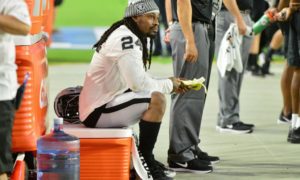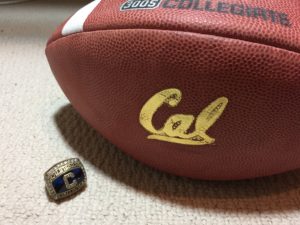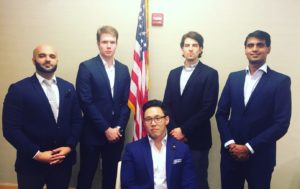September 18th, 2017
Beast Mode Is Back! When Actions Speak Louder
John Junyoung Lee, MD

John Junyoung Lee, MD, is the 2017-18 Chief Medical Resident in Internal Medicine at the University of Miami at Holy Cross, Fort Lauderdale, FL
Cal Football
I bleed blue and gold. No, I am not talking about Michigan, West Virginia, or Notre Dame. I am definitely not talking about UCLA Bruins (by the way, UCLA fans, a bruin is a brown bear). That’s right — I am a die-hard Cal Bears fan.
Thanks to Cal football, and particularly to legendary Marshawn Lynch, my college days were filled with excitement. (I am counting on you, Coach Wilcox.) Marshawn, an Oakland-native running back, is one of the best football players to graduate from Cal, and he happens to play for my team, the Oakland Raiders. Known for his power running style and ability to break tackles, he is one of the best running backs in the NFL, and I think he makes the world a better place. You think I am being dramatic? Let me prove you wrong:
- Marshawn blesses us with his famous unfiltered one liners. Sometimes he will grant an interview, but mainly so that he doesn’t get fined.
- Fam1st Family Foundation, which Marshawn helped to co-found with his relative, Josh Johnson (NFL QB), provides education and empowerment to underprivileged youth.
- Have you ever seen anyone better at “ghost riding the whip”?
- Marshawn Lynch sat down during the national anthem at Raiders preseason game against Arizona Cardinals. Judging by the national uproar that followed, actions still speak louder than words. Just ask Marshawn about it. Oh, wait — he might not answer your question.

Aug 12, 2017; Glendale, AZ, USA; Oakland Raiders running back Marshawn Lynch (24) prior to the game against the Arizona Cardinals at University of Phoenix Stadium. Credit: Matt Kartozian-USA TODAY Sports
Marshawn did not immediately elaborate on his action, but his sit-down happened in the wake of the violence at the white supremacist rally in Charlottesville and followed Colin Kaepernick’s protest against racial injustice and police brutality against people of color. Marshawn’s simple action, or inaction, polarized the football community and ultimately achieved its intended purpose: to sustain and stimulate conversation about what happened at Charlottesville and across the nation.
When pressed by the media about his anthem sit-down, Marshawn said, “So my take on it is, $#!t has to start somewhere, and if that was the starting point, I just hope people open up their eyes to see that there’s really a problem going on, and something needs to be done for it to stop. And if you’re really not racist then you won’t see what he’s doing as a threat to America, but just addressing a problem that we have.”
Racism
Individual and structural, overt and implicit — pervades every state and every industry, and medicine is not immune to it. While we doctors use objective measures, such as lab tests, to diagnose patients’ ailments, we also use heuristics in our medical decision-making, depending on our categorizations of people based on physical characteristics, such as race and ethnicity. And sometimes, a patient’s race becomes a confounder: A black patient’s pain is treated differently from a white patient’s pain.
The patients also bring their own biases and stereotypes to the hospital. A typical male Floridian octogenarian, meaning a white-haired transplant from New York or a ‘snow bird,’ presented to our emergency department for acute heart failure exacerbation. He was huffing and puffing until we put him on a noninvasive positive-pressure ventilation. Remarkably, between his gasps for his next breath, the patient managed to point at one of our residents of Middle Eastern heritage and to spurt out the following string of words: “I… Don’t Want… His Kind… Treating Me.” It was a paradigm of how not to start a vulnerable yet trusting relationship between a patient and a physician.
The story might seem to show an isolated incident, but our hospital has been getting such requests, with increasing frequency, in the past few months. Why? We are not sure, but we know that since the last presidential election in the U.S., there have been multiple reports of racist- and hate-fueled harassments and acts of intimidation around the country.
How Do We Fight Racism?
How do we approach such a sour situation in medicine?
Our duty as physicians is, first and foremost, to treat and to stabilize patients. Once patients are stable, those with competency have the right to refuse care under informed consent. In other words, patients can refuse care from unwanted physicians. In turn, physicians are also freed from our Hippocratic Oath to “consider for the benefit of my patient and abstain from whatever is deleterious and mischievous.” It would be deleterious and mischievous to force a professional relationship that was built on bigotry.
While letting patients choose physicians based on race, ethnicity, gender, or sexual orientation seems like allowing hate to win, stepping away from the ‘fire’ helps physicians to protect themselves from unwarranted verbal assaults and constant emotional abuse. Physicians are allowed to acknowledge their human emotions, too.
We must perform our duties as physicians, but we do not have to tolerate hate. I recommend physicians to remove themselves from hurtful encounters, but I also encourage physicians to advocate for, or at least try to understand, someone from a different background. Unfamiliar does not have to equal uncomfortable: See it as a learning opportunity. After this blog, I might even become the recipient of racially charged comments. I am, however, willing to embrace whatever comments are directed at me. Why? Because that’s exactly what this is about: to break bread and generate conversations as a way to break barriers and hate. And besides, I could not turn down an opportunity to write about Beast Mode in the New England Journal of Medicine.
Go Bears!
p.s. Marshawn, holla back at your boy! Maybe when Raiders come to play Miami Dolphins in November?





Great post, I’m so happy that we as medical professionals are ready to begin this conversation on how hate and racism is also present within medicine.
Thank you for your kind words. I hope that we can generate more conversations- please help and share this message!
We are truly dealing with two different world views, and additionally others with some blend of the two.
You and I grew up in a very diverse city (albeit asians were a small chunk of high school), and California itself has cities where 30% are Asian.
Just visiting cities like Medford, OR or even Fresno, CA, shows me how people can treat others with different ethnic backgrounds. But along the lines of what you wrote, the best thing we can do is to understand their background and their viewpoints and hope they can show reciprocal respect and do the same.
It is easy for people to fault the other side but it is not easy to place one’s feet into someone else’s shoes.
I can’t imagine being in medicine where the doctor might feel racism from the patient, and then be under some oath to treat someone as best as they can. Even worse, being a patient and feeling the doctor has prejudiced beliefs. I do believe what you say is the best we can all do, and that is to do our best to understand each other.
And sorry but not sorry that USC took down CAL 🙂
Agree – great column. There is quite a bit written and taught about how unconscious bias affects our approach to patients (race, weight, gender, social class, alcohol/ drug history, to name a few) – we need more discussions on responding to expressed bias towards physicians on the part of patients.
Please spare me the megaphone of echo on ‘Racism”
This practice on kneeling at a football game and disrespecting the United States flag is predicated on a FALSE narrative related to the shooting of Michael Brown.
The FACTS showed that the police shooting was for good cause of a criminal individual who had committed several crimes that day, that last of which was assaulting and trying to take a police officers’s gun.
Hands Up Don’t Shoot is a FRAUD; false story upon which this whole melodrama has enfolded. These displays at football games show ignorance and politics.
Physicians should base decisions, in and outside the clinic, on FACTS and careful thought not merely ‘following the mob’ mentality.
When someone sees racism everywhere, and calls everyone who disagrees with him a racist, what do you call that person ?
I think you are COMPLETELY missing the point. Stever Kerr couldn’t have said it better- “do you know what’s disrespectful to our flag? Racism”.
If you narrow down and simplify the current civil discourse to one incident, you are isolating pervasive racism to one event, which is extremely myopic. Never mind the fact that 12 bullets were sprayed (full cartridge capacity of Sig 9mm), but what about other racially driven incidents, including the one that is narrated in this blog? Do those incidents not matter either? Dismissed with ignorance?
You are missing the point of Dr. Lee’s blog as you have missed the point behind the kneeling- it’s never meant to disrespect the flag; he is simply pointing out that there are prejudices (race, gender, weight, religion, etc) from patients to physicians, physicians to patients. It’s not about black and white, but yellow, brown, obese, thin, rich, poor, straight, gay, christian, muslim, jewish, and more.
When someone sees racism everywhere, but chooses to call silent protesters, sons of bitches and tries to shut them up by diverting the situation to ‘disrespecting OUR flag’, what do you call that person? It’s his flag, her flag, your flag, just as much as it is my flag. When you say our flag, i hope you learn to use your possessive pronoun with the most sincerity.